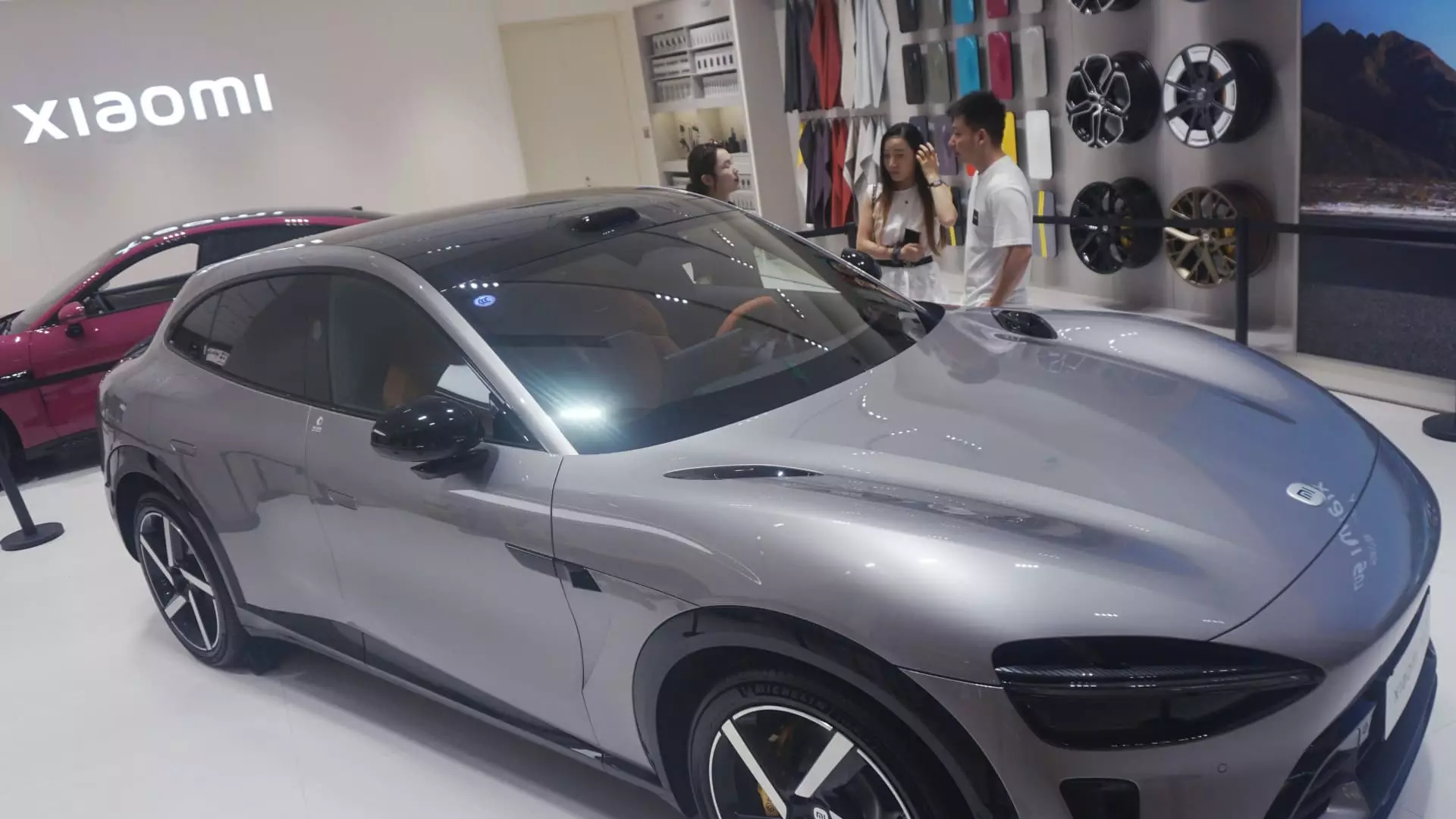Xiaomi’s recent introduction of its electric luxury SUV, the YU7, signals a significant shift in the fiercely competitive electric vehicle (EV) landscape, particularly in China. The tech giant, traditionally recognized for its smartphones and consumer electronics, is now orchestrating a bold challenge to Tesla’s dominance by delivering an attractive combination of performance, affordability, and innovative technology. The rapid market response — with over 200,000 orders flooding in within mere minutes of the launch — is undeniable evidence that consumers are keenly receptive to Xiaomi’s ambitions.
Unlike many newcomers who tread cautiously, Xiaomi approached the EV market with a clear strategy: compete directly on cost and performance. The YU7’s starting price at 253,500 yuan ($35,322) undercuts Tesla’s Model Y by roughly 10,000 yuan, shaking up pricing expectations and fueling a price war. This aggressive pricing strategy not only challenges Tesla’s market share but also pressures other EV manufacturers to rethink their value propositions. It’s a confident move from a company that started its EV journey less than a year ago, illustrating Xiaomi’s capacity to leverage its expansive ecosystem and supply chain strengths.
Technological Edge and Consumer Appeal
Xiaomi is leaning heavily into both advanced hardware and enhanced user experience to carve out its competitive edge. With a claimed driving range of over 760 kilometers (472 miles), the YU7 surpasses Tesla’s extended-range Model Y, addressing one of the largest consumer concerns: range anxiety. This improvement in battery performance is a critical selling point, especially for EV buyers who prioritize long-distance travel without frequent recharging.
However, Xiaomi also acknowledges where it lags. While the YU7 is equipped with cutting-edge driver-assist technology powered by Nvidia’s Thor chip, it still falls short in comparison to Tesla’s Autopilot system. This admission signals Xiaomi’s realistic approach to product development, emphasizing continuous improvement rather than blind competition. The nuanced embrace of artificial intelligence features — such as gesture-based controls and smartphone-linked parking assistance — also reveals Xiaomi’s understanding that modern consumers crave intuitive, connected vehicle experiences, not just raw driving specs.
Beyond Automobiles: Xiaomi’s AI-Driven Product Ecosystem
Xiaomi’s EV debut is just one facet of its broader push into AI-integrated products. The simultaneous launch of AI-powered smart glasses underscores the company’s commitment to becoming a leader in next-generation consumer technology. These glasses, designed to rival Meta’s Ray-Ban smart glasses, offer adaptive tinting, QR-code payment integration, and interactive AI functions like photo capture and real-time translation. Priced affordably at 1,999 yuan ($279), these glasses target a tech-savvy demographic eager to blend fashion with practical smart features.
This diversification of AI products illustrates Xiaomi’s strategic vision of creating an interconnected ecosystem where its consumer electronics seamlessly complement one another. Such a strategy not only boosts brand loyalty but also enhances user convenience through cross-device integration, contributing positively to Xiaomi’s long-term growth and relevance.
Strategic Timing and Market Context
The timing of Xiaomi’s YU7 launch holds strategic significance. Accelerating the launch from an anticipated July release to late June capitalizes instantly on the momentum of an intensifying EV price war within China, a market that is rapidly evolving and highly dynamic. Such agility in market timing suggests Xiaomi is flexible and responsive — key traits in a sector defined by rapid innovation and shifting consumer preferences.
Moreover, Xiaomi’s ascent in the EV sector exemplifies the democratization of electric vehicles. The company’s ability to bundle advanced technology, competitive pricing, and brand appeal together in a relatively short period poses serious challenges to incumbents and underscores the growing capability of technology companies to enter and disrupt traditional automotive markets.
Perspective on Xiaomi’s Ambitions
While some might criticize Xiaomi for moving aggressively into a capital-intensive industry dominated by well-established players, this strategy makes sense when viewed through the lens of Xiaomi’s broader ecosystem and manufacturing efficiencies. Rather than developing components from scratch, Xiaomi benefits from its existing supply chains and technological partners, enabling rapid iteration and market entry. The real test will be whether Xiaomi can sustain quality control, after-sales services, and technological advancements at scale — especially given the complex demands of automotive manufacturing versus consumer electronics.
Xiaomi’s YU7 launch is more than just a product release; it is a signal of the shifting balance in the global EV market. Their ability to combine cost competitiveness, strong technological features, and an evolving AI-integrated lifestyle ecosystem could herald a new era not just for electric vehicles, but for how tech companies define mobility and consumer engagement. With its ambitious steps, Xiaomi is crafting a bold new narrative in one of the most consequential industries of our time.

